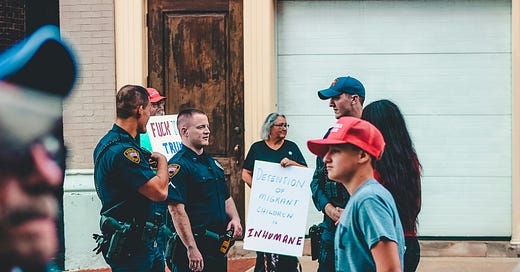For a moment, let’s discard the headlines and the performative political puffery and ask the question behind the question of immigration.
What would the ground conditions need to be to compel you to leave your home, leave your family, leave your country … and walk thousands of miles, perhaps penniless, to cross a treacherous border into a country with a different language who doesn’t want you?
Those ground conditions would need to be horrendous. Yet, this is what millions of people do. They take unfathomable risks because they live in abject poverty and under constant threat of violence.
For every single MS-13 gang member (there are an estimated 6,000 in the US), there are thousands of people simply seeking to escape immiseration and oppression.
This does not mean that I’m here to argue for open borders. But in order to develop a thoughtful, compassionate, and effective immigration policy, Americans need to look in the mirror and acknowledge where U.S. foreign and domestic policy has contributed to far-reaching instability in Latin America and where this participation has directly led to mass migration.
U.S Destabilization of Latin America
In 1954, in Guatemala, the CIA orchestrated a coup (Operation PBSUCCESS), installing a military dictatorship, deposing Jacobo Árbenz, the democratically elected leftist President. Árbenz had sought land reform that threatened U.S. business interests, most notably the United Fruit Company. This coup triggered decades of civil war, mass violence, and repression.
In 1973, the CIA once again supported a coup against Salvador Allende, the democratically elected President in Chile, and helped to install General Augusto Pinochet. The outcome was a 17-year dictatorship marked by brutal torture, executions, and disappearances.
In the mid-1980s, the U.S. supported right-wing Contra rebels to overthrow the leftist Sandinista government in Nicaragua despite Congress banning the funding. The Reagan administration circumvented Congress in what became known as the Iran-Contra Affair. The U.S. government illegally sold weapons to Iran despite an arms embargo, then filtered the profits to fund Contra rebels in Nicaragua, and then lied to Congress and the public about both.
In El Salvador, the U.S. provided over $4.5 billion in military and economic aid to the right-wing paramilitary Salvadoran government between 1980 and 1992. This support was justified under Cold War logic: to prevent another “Cuba” in Central America. The result: 75,000+ people killed (most of them civilians) and tens of thousands disappeared or tortured. Over 1 million Salvadorans were displaced, many fleeing to the U.S. — planting early seeds for the migration crisis and gang proliferation.
For decades, the United States has militarized countries like Mexico and Colombia as part of our “war on drugs.” We have poured funding, training, and arms into these countries, exacerbating cartel violence while never addressing the root cause. We’re the ones consuming the product!
The list could go on for pages and pages. America’s immigration “crisis” is, to a great degree, self-inflicted.
Do Undocumented Immigrants Really Drain Resources & Commit Crimes?
Undocumented immigrants are frequently scapegoated for a range of domestic challenges. The familiar accusations resurface again and again: that they drain public resources, take jobs from citizens, or pose a criminal threat. These tropes persist despite overwhelming evidence to the contrary.
Despite lacking legal status, undocumented immigrants contribute tens of billions of dollars annually to the U.S. economy—particularly through payroll taxes that fund Social Security and Medicare. According to 2024 data from the Institute on Taxation and Economic Policy (ITEP), undocumented workers paid over $25 billion into Social Security, $6.4 billion into Medicare, and an additional $1.8 billion into unemployment insurance—a total of nearly $34 billion in mandatory payroll taxes in 2022 alone. These contributions are typically made through automatic paycheck withholding, often under borrowed or invalid Social Security numbers.
Crucially, undocumented immigrants are ineligible for most federal benefits, including Social Security and Medicare payouts, meaning their contributions largely remain in the system, creating a $12 billion net surplus. The Social Security Administration has acknowledged that these payments help shore up the solvency of entitlement programs. Far from being a drain on public resources, undocumented workers are helping sustain the very systems from which they are excluded.
Undocumented migrants also fulfill a significant share of low-wage, labor-intensive, and often "menial" jobs that are essential to the functioning of the U.S. economy. These are roles that many citizens are unwilling to do. An estimated 50%–70% of all U.S. farmworkers are undocumented. They plant, pick, sort, and pack produce under physically demanding and hazardous conditions. Without these workers, crops would go unharvested, food prices would spike, and supply chains would break. This same phenomenon also applies to construction, hospitality work, meatpacking, food processing, and elder and child care. Undocumented workers work for lower wages and fewer benefits.
In terms of crime, according to the CATO Institute, the conviction rate of US-born citizens in Texas is 1,422 per 100,000 people. For undocumented immigrants, the conviction rate is 856 per 100,000. That’s an approximately 40% lower crime rate for undocumented immigrants than for U.S.-born citizens. For legal immigrants, it’s even less: the conviction rate is 535 is 100,000.
Of course, the United States needs a sane, orderly policy at the border. We need to patiently deport undocumented criminals without eschewing due process. We also need to build trust with and invest in our citizenry. By providing healthcare, education, housing assistance, food security, and family services, Americans will be less susceptible to scapegoatism.
One thing is for sure: America’s immigration problems are not going to be solved with seat-of-the-pants deportation raids and the militarization of our cities.
The key to creating long-term immigration stability in the United States relies not only on thoughtful domestic policy, but also a foreign policy that fosters greater stability among our neighbors.







If the information in this article is fact, then we DO have solutions for our so called immigration problems.
Bravo, Jeff, bravo!!! Very well said, and I could not agree more...this deserves wide circulation...